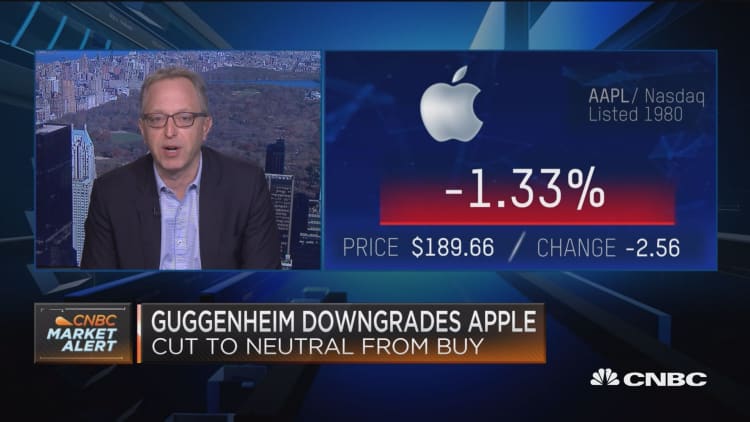
Shares of Apple, a bellwether for the technology sector, dipped into a bear market on Wednesday as the decline from its recent all-time high briefly totaled more than 20 percent.
Apple, which fell more than 2.5 percent Wednesday, closed at $186.80 per share. The shares finished 19.99 percent off their record high of $233.47, clinched on Oct. 3; Apple's value has dropped to about $886 billion from $1.13 trillion at those October highs.
Investors have grown concerned that the Cupertino, California-based company, renowned for years of innovative technology, will suffer declines in iPhone unit sales over the next couple of years.
Apple began the month by reporting that iPhone shipments missed Wall Street expectations for the quarter and said that it will no longer report how many iPhones it sells, a move some took as a tacit sign that the company's largest segment by revenue may be set for weaker growth.

"It's like Tim Cook opened up Pandora's Box by pulling the unit metrics on iPhone shipments," Daniel Ives, analyst at Wedbush Securities, told CNBC on Wednesday. "As there's less transparency in the story, investors have feared that Apple's trying to hide decelerating unit growth. When you see general nervousness across the tech space, combined with expectations that Apple was going to carry the weight of the FANG names ... it's kind of been a perfect storm."
The iPad maker is morphing from a business propelled by the volume of devices it ships into one that stresses luxury products and software sales. That evolution has been marked by shockwaves for much of the technology space, with several of Apple's largest semiconductor suppliers noting marked declines in order volume.
Apple shares dropped by 5 percent on Monday alone after one of its chipmakers, Lumentum (LITE), said one of its largest customers reduced shipments. Though Lumentum, which makes 3D sensing lasers used in Apple's Face ID technology, did not mention Apple by name, Wall Street punished the iPhone maker as the prime suspect.
"You're talking not just about what Apple represents, but its effect across the whole food chain, including semiconductors," Ives added. "As the core 'FANG' names have just taken gut punches left and right over the past few months, this latest downturn for Apple — the degree of it — has really caught investors off base."

Despite more expensive phones buoying the average selling price of iPhones, some Wall Street firms aren't so sure it'll be enough to offset the lower volume. Analysts at both Guggenheim Partners and UBS on Wednesday cut their price forecasts for Apple shares and blamed lower phone sales expectations for a dimmer outlook.
Guggenheim's Robert Cihra, for example, downgraded Apple's stock to neutral from buy. "Unlike last year [we] do not see ASP (average selling price) increases providing enough offset, with our forecast that blended iPhone ASPs increase only +3%Y/Y, leaving iPhone revenues -2%Y/Y," Cihra wrote.
"Moreover, we see growing risk of even softer iPhone unit demand, with downside in China, India and other emerging markets, where Apple may need to start considering lower price points," the analyst added.
Cihra's note followed that of Goldman Sachs, which on Tuesday slashed its iPhone estimates and lowered its price target.
— CNBC's John Melloy contributed reporting.


